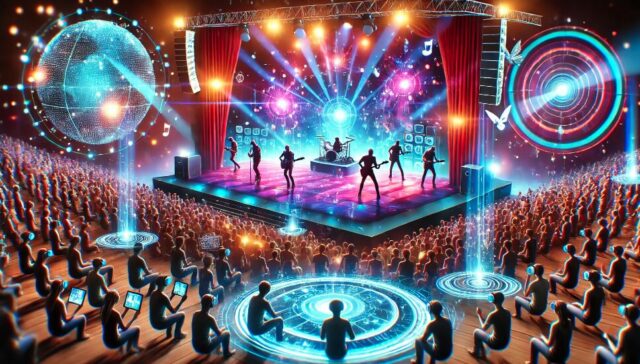The entertainment industry has undergone a dramatic transformation in recent years, driven by rapid technological development. One of the most significant changes has been the rise of virtual concerts, a trend that gained unprecedented momentum during the COVID-19 pandemic. As social distancing measures restricted traditional live performances, artists and event organizers turned to digital platforms to connect with audiences, forever changing the landscape of live entertainment.
The Evolution of Virtual Concerts
Virtual concerts are live music performances that take place in a digital environment, accessible to viewers through various devices and platforms. While the concept isn’t entirely new, the pandemic catapulted virtual concerts into the mainstream. Notable examples include Travis Scott’s groundbreaking Fortnite concert, which attracted over 12 million concurrent viewers, and BTS’s “Bang Bang Con,” which drew nearly 800,000 paid viewers from 107 countries.
Technological Innovations Driving Virtual Concerts
The success of virtual concerts relies heavily on cutting-edge technology. Virtual Reality (VR) and Augmented Reality (AR) are at the forefront, offering immersive experiences that blur the lines between physical and digital worlds. Streaming platforms like YouTube, Twitch, and even Zoom have become vital conduits for these events, providing the necessary infrastructure to reach global audiences. Additionally, developments in sound and video production technology ensure high-quality performances that rival in-person experiences.
Benefits of Virtual Concerts
Virtual concerts offer numerous advantages over traditional live events. They provide unparalleled accessibility, allowing fans from around the world to attend performances regardless of geographical constraints. This global reach extends to individuals who may be unable to attend physical concerts due to disabilities or other limitations. Moreover, virtual concerts are often more cost-effective for both organizers and attendees, eliminating expenses related to venue rentals, travel, and accommodation. The reduced carbon footprint of virtual events also aligns with growing environmental concerns in the entertainment industry.
Challenges and Solutions
Despite their benefits, virtual concerts face several challenges. Technical issues such as streaming quality and latency can significantly impact the viewer experience. To address this, event organizers are investing in robust streaming infrastructure and exploring technologies like 5G to ensure seamless delivery. Audience engagement remains another crucial challenge, as live-stream environments lack the energy of a live crowd. Innovative solutions include interactive features like live chats, virtual meet-and-greets, and customizable avatars to enhance viewer participation.
Online Casinos and Virtual Entertainment
Interestingly, the world of online casinos has also embraced the live-stream concert trend, integrating live performances and events into their digital platforms. This fusion of entertainment forms offers several benefits for online casinos, including attracting a broader audience, enhancing user experience, and increasing engagement. For instance, some online casinos now host virtual concerts featuring famous artists as part of their entertainment offerings. These events not only provide additional value to online casino patrons but also create unique marketing opportunities.
The integration of live-stream concerts in online casinos represents a broader trend of diversification in the digital entertainment space. By offering a mix of online casino gaming and live music experiences, online casinos are positioning themselves as comprehensive entertainment hubs. This strategy has proven particularly effective in attracting younger demographics who seek varied and interactive online experiences. Only leading online casino platforms like these ones are not pioneering this trend, which is expected to expand on the smaller platforms too.
Case Studies of Successful Virtual Concerts
One standout example of a successful virtual concert was Dua Lipa’s “Studio 2054” performance. This pay-per-view event combined elements of a music video, live concert, and variety show, attracting over 5 million viewers globally. The production quality and innovative format set a new standard for live-stream concerts.
Another notable case is Billie Eilish’s “Where Do We Go? The Livestream” concert. This event utilized XR (extended reality) technology to create a visually stunning virtual environment that responded to the artist’s movements in real time. The concert not only showcased Eilish’s music but also addressed social issues, demonstrating the potential of virtual concerts as platforms for both entertainment and activism.
The Future of Virtual Concerts
As technology continues to evolve, the future of virtual concerts looks promising. Advancements in VR and AR are expected to create even more immersive experiences, potentially allowing viewers to “attend” concerts as fully realized avatars in virtual spaces. The integration of AI could personalize each viewer’s experience, adjusting visuals and sound based on individual preferences.
While traditional live concerts will likely remain popular, virtual concerts are carving out their own niche in the entertainment landscape. They offer unique opportunities for artists to connect with fans, experiment with new formats, and reach global audiences. As the lines between different forms of digital entertainment continue to blur, we can expect to see more innovative collaborations between music, gaming, and interactive media.
Conclusion
The rise of live-stream concerts represents a significant shift in the entertainment industry, driven by technological innovation and changing consumer preferences. From online casinos incorporating live music events to global superstars performing in virtual worlds, the possibilities seem endless. As we move forward, virtual concerts will likely continue to evolve, offering new and exciting ways for artists to connect with their audiences and for fans to experience live music. While they may not entirely replace traditional concerts, virtual performances have undoubtedly secured their place in the future of live entertainment.





